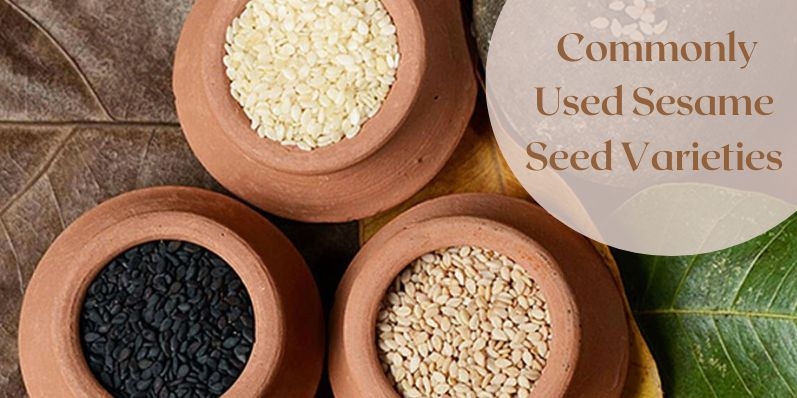
26-09-2023
Commonly Used Sesame Seed Varieties
- Admin
Sesame seeds, derived from the flowering plant Sesamum indicum, have been cultivated for thousands of years and have played a significant role in cuisines around the world. These tiny seeds are not only packed with flavor but also boast numerous health benefits. In this article, we will delve into the world of sesame seeds and explore some of the commonly used varieties, each with its unique characteristics and culinary applications.
White Sesame Seeds
White sesame seeds are the most common variety and are often referred to as "hulled sesame seeds" because the outer husk has been removed. They are light in color and have a mild, nutty flavor. White sesame seeds are commonly used in baking, as a topping for bread, buns, and bagels, and for making tahini, a creamy paste used in Middle Eastern and Mediterranean cuisines.
Black Sesame Seeds
Black sesame seeds are a striking contrast to their white counterparts. They have a rich, nutty flavor with a slightly bitter undertone. In Asian cuisines, particularly in China and Japan, black sesame seeds are used in both sweet and savory dishes. They are often sprinkled over sushi, added to desserts like black sesame soup or ice cream, and incorporated into various sauces and dressings.
Brown Sesame Seeds
Brown sesame seeds fall somewhere between white and black varieties in terms of flavor and appearance. They have a slightly stronger flavor than white sesame seeds and are often used in dishes where a more pronounced sesame flavor is desired. Brown sesame seeds are frequently used in Middle Eastern cuisine to garnish dishes like falafel and hummus.
Golden Sesame Seeds
Golden sesame seeds are less common but gaining popularity for their unique appearance and milder flavor compared to their black counterparts. They are often used in baking, confectionery, and as a decorative element in dishes. In Indian cuisine, they are used to garnish sweets and savory snacks.
Toasted Sesame Seeds
Toasted sesame seeds, regardless of their color, are sesame seeds that have been lightly browned in a dry skillet or oven. Toasting enhances their nutty flavor and makes them more aromatic. Toasted sesame seeds are a versatile ingredient, sprinkled over salads, rice dishes, stir-fries, and used in homemade granola bars and energy bites for an added crunch.
Sesame Seed Oil
Sesame seed oil, extracted from sesame seeds, is a fundamental component of many Asian cuisines. There are two primary types of sesame seed oil: light and dark. Light sesame oil has a mild flavor and is suitable for stir-frying and salad dressings. Dark sesame oil, also known as toasted sesame oil, has a stronger, nuttier flavor and is often used as a finishing oil for flavoring dishes, particularly in Chinese and Korean cuisines.
Unhulled Sesame Seeds
Unhulled sesame seeds are the whole seeds with their outer husks intact. They have a more robust flavor and a slightly gritty texture compared to hulled sesame seeds. Unhulled sesame seeds are used to make tahini with a more rustic and pronounced sesame flavor.
Organic Sesame Seeds
Organic sesame seeds are grown without synthetic pesticides or fertilizers, making them a popular choice for health-conscious consumers. These seeds are available in various colors and forms, including white, black, and unhulled, providing options for those who prioritize organic ingredients in their cooking.
Conclusion
Sesame seeds, with their rich history and diverse range of varieties, have earned their place in the global culinary landscape. Each type of sesame seed offers a unique flavor profile and culinary application, from the mild and creamy white seeds used in tahini to the bold and distinctive black seeds featured in Asian sweets and savory dishes. Whether you're seeking to add a nutty crunch to your salads, enhance the flavor of your stir-fries, or create a delightful dessert, sesame seeds have something to offer every palate.
Moreover, the nutritional benefits of sesame seeds, including their high content of healthy fats, protein, and essential minerals like calcium and iron, make them a valuable addition to a balanced diet. As sesame seeds continue to inspire chefs and home cooks alike, their versatility and cultural significance ensure they will remain a staple in kitchens around the world for generations to come. So, the next time you enjoy a sesame-crusted dish or drizzle sesame oil over your stir-fry, take a moment to appreciate the diversity and culinary richness of this tiny yet mighty seed.